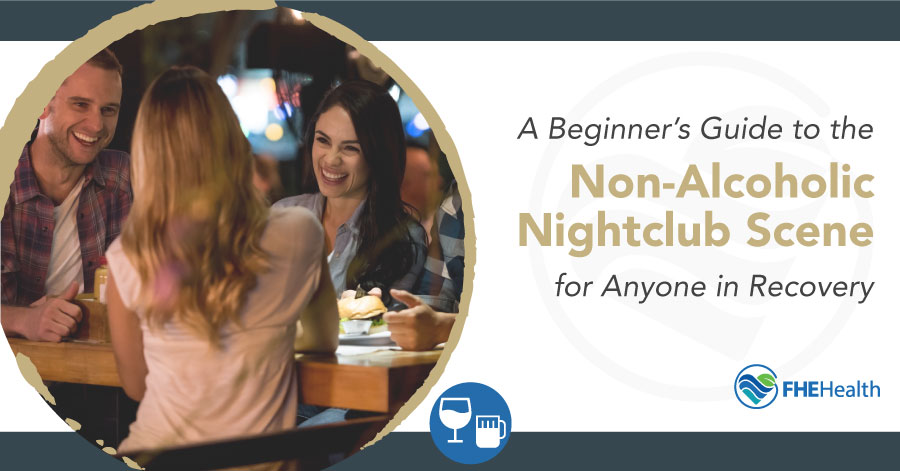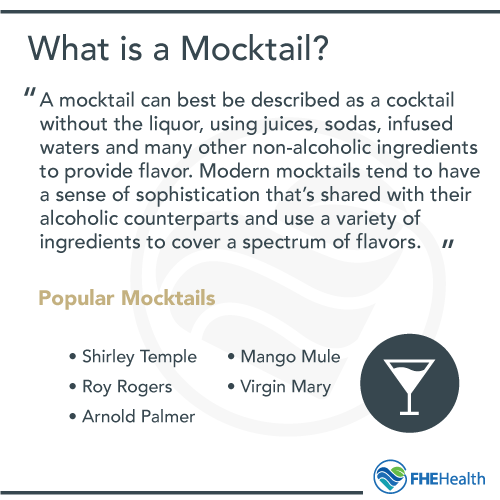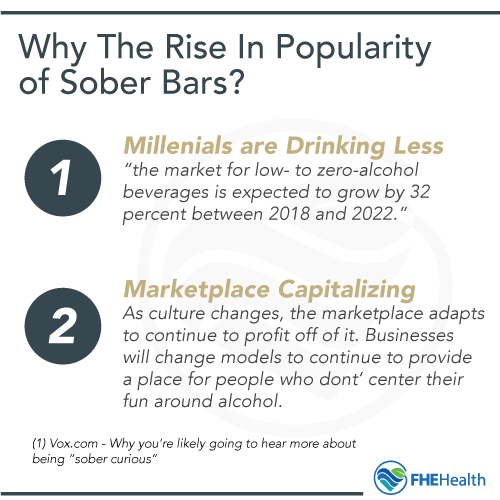
Sitting down at your computer, opening a search engine and inputting “sober bars near me” might seem counterintuitive, but, in fact, locations with this exact premise are growing in popularity.
You might be asking, “How can you have a bar without alcohol?” It’s a good question, and one we’re attempting to answer for our past patients in recovery. Is it the alcohol that poses an issue for someone trying to recover from addiction to drugs and alcohol, or does the environment also play a role?
Sober bars, also known as non-alcoholic, may not be on every street corner, but they’re growing in popularity, which poses the questions: What’s the implication of this business model on people in recovery, and are these bars being responsible when they market themselves to addicts?
We’ll attempt to answer these questions here.
What Are Non-Alcoholic Bars?
 In some of the trendiest places in the world — Manhattan and Brooklyn, New York, and London, UK, to name a few — bars aimed at providing a way for clientele to enjoy themselves and the company of others without alcohol are popping up.
In some of the trendiest places in the world — Manhattan and Brooklyn, New York, and London, UK, to name a few — bars aimed at providing a way for clientele to enjoy themselves and the company of others without alcohol are popping up.
One article details the rise of Getaway, a sober bar in New York City, highlighting the growth of so-called “sober tourism.” Put simply, choosing not to drink is becoming trendy.
Many of these new fixtures of the food and beverage economy are in trendy areas. Think Bushwick and Williamsburg in Brooklyn, for example, but others aren’t. A few years ago, the first of such concepts to hit the Midwest opened in Crystal Lake, Illinois, a small suburb of Chicago.
The Rise of the Sober Club Scene
Sober nightclubs are also becoming more popular, perhaps even more surprising because nightclubs have been known not just for heavy drinking but the consumption of so-called party drugs such as ecstasy and LSD to enhance the experience.
One such experience is right in our backyard, with Daybreaker, a rave-type festival that happens in the morning, hitting Miami in 2019. The event stresses the departure of the toxic environment of the nightclub scene, and by making the event in the morning (before work, even), it shifts the narrative to something that eschews alcohol and focuses on physical and mental health.
Why Now?

The way we understand it, there are two main reasons why a person would open a bar like this:
- They want to create a place for people in recovery to go without temptation.
- They’re capitalizing on a growing trend.
Of course, the first explanation is obviously less cynical than the second, and it’s true. Like the example in suburban Chicago, many non-alcohol bars are opening up to be a resource for recovering addicts.
However, that doesn’t mean the second explanation is invalid. There’s a reason why many of these bars are appearing in high-dollar, trendy neighborhoods filled with younger people, and, as an article in The Atlantic pointed out, millennials don’t drink as much.
There’s a growing number of people moving away from consuming alcohol and inherently linking this behavior to a recipe for fun. Could it be that these new sober bars are just juice bars with a clever new spin on their marketing?
The answer is “yes,” but this may be part of an encouraging trend. If society is shifting away from the mindset that you have to drink to have fun, the temptations won’t be as high for recovering alcoholics, decreasing the pressure put on them by peers in their jobs, their friends and their lives in general.
So, Are Sober Bars Good?
It’s an oversimplification of the issues to call sober bars and clubs “good” or “bad.” At face value, they’re a positive factor. They give people in recovery a place to go to enjoy an evening out with friends where the expectation of zero alcohol is established, and where they can be sure that temptation to drink won’t be physically present.
There’s a potential problem bubbling under the surface, however. For some addicts, the allure of a bar is more than just the alcohol. It’s the late nights with friends, the dim lighting and, generally, the environment that you find in a bar.
If these sober bars check the same boxes, then they may lead to a person making the transition to a real bar. After all, sober bars are generally in commercial areas, where they’re likely to be surrounded by plenty of locations where alcoholic drinks are definitely on the menu.
Be Honest With Yourself
Contrary to popular belief, you can go out when you’re in recovery. Whether you’re going to a bar that serves alcohol or a sober bar near you, you have to be honest with yourself and ensure that you have the tools to guarantee you won’t be jeopardizing your recovery.
This is why it’s important to be in tune with your recovery and maintain a strong sense of connection to your support system. Only you know your triggers, but the influence of others can keep you accountable.
One way to leverage the value of these sober bars is to visit for the first time with a group of other sober individuals. Enjoy yourself while you’re there, but after, take the group back to a meeting hall or a group member’s home and debrief. Was the experience positive for everyone? Go around the room and discuss the experience of each member, and judge whether these bars and nightclubs are a positive influence or simply a place where triggers are hiding.
Alcohol Treatment at FHE Health
If you find yourself taking part in problem drinking behaviors in bars and nightclubs, you may be suffering from addiction. At FHE Health, our treatment staff is trained to assist anyone who needs help with alcoholism at any stage in their treatment or recovery.
To learn more, contact us today.






